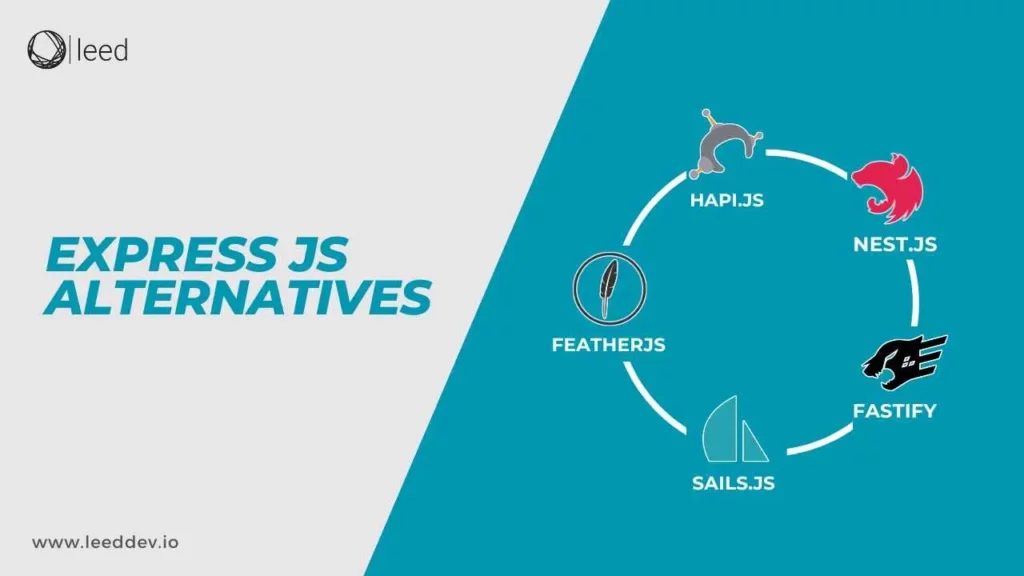Looking for Express JS alternatives? While Express is popular, there are other frameworks that might suit your needs better. Some offer better performance, easier scalability, or simpler ways to build RESTful APIs. For example, Fastify can handle 30,000 requests per second, and NestJS integrates smoothly with GraphQL. Let’s explore the top Express JS competitors that could be a perfect fit for your next project!
What is Express JS?
Express.js is a simple framework for Node.js. It makes building web apps and APIs faster and easier. Created in 2010 by TJ Holowaychuk, it quickly became popular among developers.
Express helps with common tasks like routing, middleware, and handling requests. It lets you define routes and manage HTTP requests without extra hassle, so you can focus on the important parts of your app, like the business logic.
What makes Express special is its flexibility. It doesn’t force you into one way of doing things. Whether you’re building a small or big app, Express adapts to your needs.
Top Express JS Alternatives
Let’s discuss the leading alternatives for ExpressJS:
1. Nest.js
NestJS is a modern framework for building server-side applications. It’s built with TypeScript, making it a great choice for developers who want type safety and clean, maintainable code. Here are some reasons that might force you to consider choosing NestJS:
- Nest.js is TypeScript-Friendly. Since NestJS is built with TypeScript, you get features like type safety and better code quality. This means fewer bugs and easier-to-read code.
- It has a modular design. The framework organizes code into smaller modules, making it easy to manage and scale as your app grows.
- It works perfectly with GraphQL, which helps create powerful APIs for handling complex queries.
Key Features
- Dependency Injection: This fancy-sounding feature makes it easier to manage services and keep your code flexible and testable.
- Middleware Functions: NestJS helps you process requests and responses smoothly while ensuring your app stays functional and secure.
- Easy to Learn: If you’ve used Angular before, picking up NestJS feels natural. Even if you haven’t, its simplicity makes it beginner-friendly.
NestJS builds on Express but offers more features. For example, its built-in tools for microservices make it a better choice for distributed systems. Big companies like Roche, IBM, and GitLab trust NestJS for their projects. It’s popular, with over 62,000 stars on GitHub and millions of downloads weekly.
2. Fastify
If you’re looking for a fast and efficient alternative to Express.js, Fastify is one of the best options. This lightweight framework is built for speed and can handle large amounts of traffic easily. It’s perfect for building APIs and applications that need to process thousands of requests per second.
Here’s why choose Fastify as Express JS alternative:
- Fastify is highly fast. It is optimized for speed and can handle 30,000 requests per second. It’s designed to minimize overhead and maximize performance.
- This alternative has JSON Schema Support. Fastify uses JSON Schema to verify requests and responses. This improves data integrity and ensures your app easily.
- It has lower costs. Fastify’s low overhead helps reduce project costs. Maintenance costs are also lower compared to other frameworks.
Core Features
- Customizable with Decorators: Decorators let developers customize responses, requests, and other server resources. This gives you full control over how your app behaves.
- Asynchronous Programming: Fastify fully supports async/await, making error handling and code writing much simpler.
- Plugin Architecture: Its flexible plugin system lets you easily add new features and create modular applications.
- Built-in Logging: Fastify comes with Pino, a highly efficient logging tool. It helps track performance and troubleshoot issues.
- Error Handling: With setErrorHandler(), you can easily identify and fix bugs in your app.
Fastify helps developers build TypeScript-based applications 20% faster than Express.js. Its clean syntax and schema validation make it a favorite for building modern apps. Big names like FabFitFun, Webiny, and Retraced use Fastify for their applications. It’s also highly popular among developers, with over 29.9k stars on GitHub and 1.7 million downloads per week.
Fastify is ideal for apps that need to handle a lot of requests efficiently, such as real-time dashboards, e-commerce platforms, or APIs for IoT devices.
3. Sails.js
Sails.js is a powerful Node.js framework that is designed for building data-driven APIs and scalable web applications. It follows the MVC (Model-View-Controller) architecture, which helps keep your code organized and easy to manage.
Here’s why you should choose Sails.js:
- This alternative follows MVC architecture. Sails.js uses the MVC pattern to separate your app into models, views, and controllers. This makes the code cleaner and easier to maintain.
- Salis.JS has real-time capabilities. With built-in WebSocket support, Sails.js is perfect for apps that need live updates, like chat applications or real-time notifications.
- It has database flexibility. Its ORM, called Waterline, works with almost any database. Whether you use SQL databases like MySQL or NoSQL options like MongoDB, Sails has you covered.
- Sails.js works very easily with any frontend framework, whether it’s Angular, React, or even plain JavaScript framework.
Core Features
- Automatic REST APIs: Sails can auto-generate RESTful APIs from your data models. This saves time and speeds up development.
- Blueprint API: With its customizable blueprint API, you can quickly create prototypes and handle standard operations without writing extra code.
- WebSocket Integration: Sails deciphers WebSocket messages, so your app can handle both HTTP requests and WebSocket connections without extra effort.
- Enhanced Security: Sails.js includes built-in protection against common threats like DDoS attacks, CSRF, XSS, and more.
Sails.js is built on Express but offers more features tailored for data-heavy and real-time apps. With easy database migrations, a strong ORM, and support for controllers and models, it’s ideal for creating maintainable and scalable apps.
Sails.js is used by well-known brands like Amazon, Microsoft, Verizon, and Paystack. Its popularity is reflected in its 22.8k stars on GitHub and around 28,000 weekly downloads.
Sails.js shines in projects that require both scalability and real-time features. It’s great for building real-time messaging apps, dashboards, or data-heavy platforms.
4. Koa.js
Koa is a minimalist framework for Node.js created by the same team behind Express. It’s built to help developers create fast, lightweight, and flexible web applications and APIs using modern JavaScript features.
Due to these reasons, you should choose Koa.js:
- Koa takes advantage of async/await, making it easier to handle asynchronous code and improving readability.
- Koa.js has an expressive middleware. Unlike Express, Koa gives you more control over the request-response cycle with a more flexible middleware system.
- It is lightweight. Koa’s minimalist design reduces overhead, making your apps faster and more efficient.
- You can add or remove functionalities easily based on your needs, giving you the flexibility to craft the exact app you want.
Core Features
- Context Object: Koa uses a context object to manage requests and responses in one place, making your code cleaner and easier to manage.
- Error Handling: Koa’s middleware allows for smart error handling. With just a try/catch block, you can handle errors without extra code.
- Futuristic: Built with ES6 features, Koa makes it easy to create complex apps with minimal effort.
- Small Footprint: Koa has a smaller footprint than other frameworks, allowing you to write leaner middleware that’s faster and easier to expand.
- Short Code: Koa keeps your code simple, with less than 550 lines of script, making it easy to get started and scale as needed.
While Koa is similar to Express, it’s more flexible and modern. However, it doesn’t come with built-in routing or pre-made middleware, so you’ll need to use additional tools like koa-router and template modules.
Koa is used by companies like Paralect, Bulb, and Taboola, showing that it’s a trusted framework for building scalable web applications.
5. Hapi.js
Hapi is a flexible and modular Node.js framework that’s known for its focus on configuration. It’s ideal for building secure, structured REST APIs and web applications. Developers love Hapi for its robust features, especially around security and input validation.
Why Choose Hapi.js?
- Hapi.js is configuration-driven. Hapi focuses on configuration, which means you can easily define your app’s behavior and settings. This helps keep your code organized and reusable.
- It is secure by design. Hapi offers a secure development environment. You can enable features like 2FA, encrypted cookies, and defined protocols to keep your app safe.
- Hapi comes with built-in validation to ensure the integrity of incoming data and protect against vulnerabilities.
- Hapi’s plugin system makes it easy to add new features and expand your app as needed.
- With Hapi, routing is simple. It’s easy to define paths, handlers, and HTTP methods, and there are no routing conflicts.
Core Features
- Authentication & Authorization: Hapi provides built-in tools for handling user authentication and role-based access, making it easy to secure your app.
- Request Handling: Hapi offers advanced options for processing and managing HTTP requests. This helps you create complex apps without complications.
- Flexible Plugins: Its powerful plugin system allows you to extend functionality and customize your app, ensuring it grows with your needs.
- Protocol Support: Beyond HTTP, Hapi also supports protocols like WebSocket, adding more flexibility to your application.
Hapi is more opinionated than Express. While Express leaves many decisions up to the developer. Hapi provides clear guidelines for things like input validation, routing, and security. This makes Hapi a better choice for developers who need more structure and built-in features.
Companies like Walmart, SalesTrip, and Hy-Vee Aisles Online use Hapi to power their apps. It has over 14.5k stars on GitHub and around 755k weekly downloads, showing that developers trust and rely on Hapi for their projects.
6. FeatherJS
FeatherJS is a lightweight framework that is designed for building small applications quickly. If you’re looking for Express JS alternative to create prototypes or single-page applications, FeatherJS is a great choice. It helps reduce configuration time, so you can get your app up and running in no time.
There is some reason that makes it a great choice like:
- With Feather. JS you can do fast development. FeatherJS helps you build apps quickly with minimal setup. It’s perfect for rapid prototyping and lightweight web apps.
- It is flexible. It works with any client-side technology, including Vue, Angular, React, and even mobile platforms like Android and iOS. It’s also compatible with a wide range of databases, both relational and non-relational.
- FeatherJS is gaining traction with over 14.9k stars on GitHub and more than 67k weekly downloads.
Core Features
- Database Support: FeatherJS offers flexible database support, making it easy to work with different types of databases, whether relational or non-relational.
- Real-Time Functionality: FeatherJS supports real-time communication, both for the backend (events like create, update, delete) and client-side (two-way messaging). This is great for live updates and notifications.
- Authentication: FeatherJS simplifies user authentication, so you don’t have to write the same code over and over again, especially for real-time apps like chat.
- REST APIs: FeatherJS automatically generates REST APIs, which helps you build modular, scalable, and lightweight applications efficiently.
FeatherJS is simpler and more flexible than Express, particularly for small apps and prototypes. It offers out-of-the-box real-time functionality and database support, making it a great tool for building modern, lightweight applications.
Companies like Didomi, Koola ChatBot Plus, and Mylo use FeatherJS to build their apps, making it a trusted choice for real-time and scalable applications.
7. Nuxt.js
Nuxt.js is a powerful framework built on top of Vue.js, designed for creating production-ready applications. It focuses on server-side rendering (SSR) and static site generation, making it a top choice for SEO-friendly and fast-loading web apps.
Here’s why you should choose Nuxt.js.
- Nuxt.js makes it easy to render pages on the server first, improving SEO and reducing load times. This is perfect for applications that need to be indexed by search engines or have fast performance.
- You will enjoy automatic code splitting. Nuxt automatically splits your code into smaller pieces, so only the necessary parts load at once, speeding up the application.
- It has a Vue ecosystem. It integrates easily with Vue.js and gives you access to Vue tools and libraries for building dynamic, interactive user interfaces.
- Easy integrations with Nuxt. JS. Whether you’re adding databases or integrating with third-party services, Nuxt makes it easy with a simple setup and a library of built-in modules.
Core Features
- Modular Architecture: Nuxt’s modular design makes it easy to manage features like authentication or analytics in a clean, organized way.
- Static Site Generation: Nuxt offers static site generation for improved performance and easier deployment, especially for certain types of applications.
- Code Division: Nuxt splits your code into smaller bundles to reduce app size and improve performance. It ensures that only the required code runs on the front end.
- Error Handling: Nuxt makes it easy to handle errors. Nuxt.js comes with built-in error handling and logging, so you can easily spot and fix issues as they come up.
- Smooth Integrations: Adding external tools or services to Nuxt is super simple. Just add one line of code, and you’re done.
What sets Nuxt apart is its built-in support for server-side rendering (SSR) and static site generation. Unlike Vue.js, which needs a lot of extra setup for SSR, Nuxt makes it easy, saving you time and effort.
Big names like OpenAI, Google, GitLab, Upwork, NASA, and GitHub use Nuxt.js, showing its strength and reliability in production-level applications.
8. Backbone.js
Backbone.js is one of the best Express JS alternatives which is a lightweight framework that helps keep your web applications organized. It offers essential tools like models, views, collections, and routers. These features make it easier to manage data and control app logic.
Here’s why choose Backbone.js.
- It’s lightweight and simple. Backbone provides only what you need to build web apps, keeping everything simple and easy to use.
- There you will have organized code. With Backbone, you can separate your app’s logic into models, views, collections, and routers, making it easier to manage.
- It works well with others. Backbone can easily integrate with other libraries or frameworks, giving you flexibility in your projects.
Core Features
- Models: Backbone’s models make it easy to manage your data. They handle binding, validation, and saving data.
- Views: Views in Backbone update the user interface when the data changes, making your app feel more interactive.
- Collections: Collections are used to manage groups of models. They help you sort, filter, and perform tasks on multiple models at once.
Backbone.js is a front-end framework, meaning it’s used to manage how data and views work in the browser. Express.js, on the other hand, is for the backend, where it handles routing and HTTP requests on the server. So, if you’re working with server-side logic, go with Express. For the front end, Backbone is a great option.
Big names like Twitter, Trello, and Pinterest use Backbone.js. It’s great for building complex apps where you need to keep the front end organized without adding unnecessary complexity.
Let’s Wrap Up with How Leed Can Assist You
There are many Express JS alternatives that can offer better performance, adaptability to growth, and flexibility for your web development needs. Whether you choose NestJS, Fastify, Sails.js, or Nuxt.js, these frameworks provide powerful features to help you build applications fast.
So if you want to build a web app or API with one of these frameworks, Leed Software Development is here to help. Here’s why:
- Expertise in Top Frameworks: We have experience working with NestJS, Fastify, Nuxt.js, and more.
- Custom Solutions: We create easy and suitable solutions to fit your business needs.
- Performance-Focused: Our solutions are designed to scale and perform and handle high traffic with ease.
- Clean and Maintainable Code: We write easy-to-maintain and high-quality code that lasts.
- Proven Track Record: We’ve delivered exceptional results for clients across various industries.
Contact us today to get started!
FAQs
Is Express faster than Laravel?
Express is generally faster than Laravel because it’s a minimalist Node.js framework with less overhead compared to Laravel, which is a full-stack PHP framework.
What’s better than ExpressJS?
It depends on your needs, but Fastify is often considered faster than Express due to its low overhead and high throughput.
Is Next.js replacing Express?
No, Next.js is not replacing Express. Next.js is a React framework for server-side rendering, while Express is a minimalist Node.js framework used for handling requests and building APIs. They serve different purposes and can even work together.
What is Hyper Express?
Hyper Express is a high-performance web framework built on top of Express. It aims to improve speed and performance by optimizing request handling and reducing latency.




